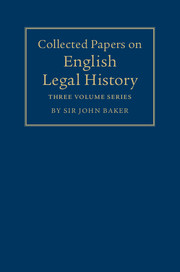Book contents
- Collected Papers on English Legal History: Volume I
- Contents
- List of Illustrations
- Acknowledments
- List of Abbreviations
- Introduction
- PART I The Legal Profession
- PART II The Inns of Court and Chancery
- PART III Legal Education
- PART IV Courts and Jurisdictions
- Collected Papers on English Legal History: Volume II
- Contents
- PART V Legal Literature
- 29 The Three Languages of the Common Law
- 30 Case-Law in Medieval England
- 31 Dr Thomas Fastolf and the History of Law Reporting
- 32 John Bryt's Reports and the Year Books of Henry IV
- 33 Case-Law in England and Continental Europe
- 34 The Books of the Common Law 1400–1557
- 35 English Law Books and Legal Publishing 1557–1695
- 36 Books of Entries
- 37 Manuscripts in the Inner Temple
- 38 Common Lawyers' Libraries 1450–1650
- 39 John Rastell and the Terms of the Law
- 40 Coke's Notebooks and the Sources of his Reports
- 41 John Selden and English Legal History
- 42 The Newe Littleton
- 43 Sir Thomas Robinson's Notebooks
- PART VI Legal Antiquities
- PART VII Public Law and Individual Status
- PART VIII Criminal Justice
- Collected Papers on English Legal History: Volume III
- Contents
- PART IX Private Law
- PART X General
- Bibliography of the Published Works of Sir John Baker
- Index
34 - The Books of the Common Law 1400–1557
from PART V - Legal Literature
Published online by Cambridge University Press: 05 December 2014
- Collected Papers on English Legal History: Volume I
- Contents
- List of Illustrations
- Acknowledments
- List of Abbreviations
- Introduction
- PART I The Legal Profession
- PART II The Inns of Court and Chancery
- PART III Legal Education
- PART IV Courts and Jurisdictions
- Collected Papers on English Legal History: Volume II
- Contents
- PART V Legal Literature
- 29 The Three Languages of the Common Law
- 30 Case-Law in Medieval England
- 31 Dr Thomas Fastolf and the History of Law Reporting
- 32 John Bryt's Reports and the Year Books of Henry IV
- 33 Case-Law in England and Continental Europe
- 34 The Books of the Common Law 1400–1557
- 35 English Law Books and Legal Publishing 1557–1695
- 36 Books of Entries
- 37 Manuscripts in the Inner Temple
- 38 Common Lawyers' Libraries 1450–1650
- 39 John Rastell and the Terms of the Law
- 40 Coke's Notebooks and the Sources of his Reports
- 41 John Selden and English Legal History
- 42 The Newe Littleton
- 43 Sir Thomas Robinson's Notebooks
- PART VI Legal Antiquities
- PART VII Public Law and Individual Status
- PART VIII Criminal Justice
- Collected Papers on English Legal History: Volume III
- Contents
- PART IX Private Law
- PART X General
- Bibliography of the Published Works of Sir John Baker
- Index
Summary
Although the common law of England was considered by academic lawyers as ‘unwritten law’, the upper branches of the English legal profession were necessarily learned in books. Chaucer's man of law may not have owned books of cases literally stretching back to the time of the Conquest, but a poet can only exaggerate fact; a serjeant at law was expected to possess an impressive array of law books. The library of a common lawyer in Chaucer's day, or in 1557, would nevertheless have been unlike that of any other lawyer in the world. This was a result of the insularity of the English legal system, centred on the courts in Westminster Hall, which followed arcane procedures developed indigenously and was independent of Romanist terminology or method. Since the universities of Oxford and Cambridge disdained to notice a body of law that was not written in Latin, and could not be expounded in lecturae, advanced instruction in the common law was provided by another university.
Though the writs and records of the law were in a sort of Latin, law French was used for virtually all professional literature. Probably it was no longer used for oral argument in court, but it was still spoken in the inns of court and was the only language in which pleadings could be framed orally at the bar before the clerks engrossed them in Latin. By 1450, law French was a language more often written than spoken, with its own arcane abbreviations.
- Type
- Chapter
- Information
- Collected Papers on English Legal History , pp. 621 - 646Publisher: Cambridge University PressPrint publication year: 2013



